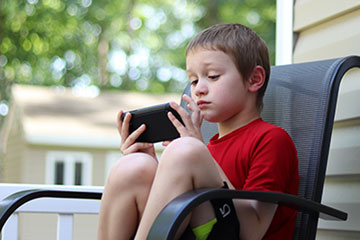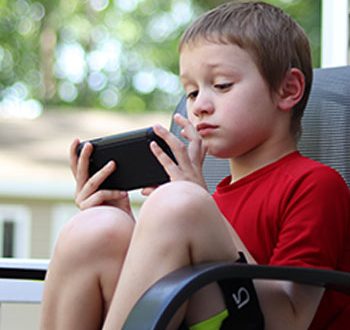
Screen time, how much is too much and how to manage it, is a subject that is raised regularly by parents and teachers at our seminars in schools and our parent internet safety crash courses. With the growing number of screens that children now have access to, the time spent on screens can be a particular challenge for families across the country.
One of the questions we asked primary school children from 1st to 6th class as part of our Zeeko All Ireland Trend Report was: ‘How much screen time do you have most days?’ The findings make for interesting reading. 15% of children in first class said that they spend more than 5 hours a day on screens, 12% of second class pupils and 12% of 3rd class pupils reported spending more than 5 hours a day on screens.
It is important to understand what we are referring to when we say ‘screen time’; the time spent looking at a laptop, PC, TV, smartphone, tablet, iPod etc. All of these devices involve ‘blue light’ technology, to which children should not be overexposed. Overexposure to ‘blue light’ can affect the melatonin levels in the brain and can lead to disturbed sleep and poor concentration.
So what is the most effective way to manage your child’s screen time? The American Academy of Paediatrics (AAP), which recommends that a child spends a maximum of 1 to 2 hours per day using screens, offers some very sensible advice on managing screen time. Here is a short overview of the advice offered by the AAP, which we support and encourage in our work.
- Treat media as you would any other environment in your child’s life. The same parenting guidelines apply in both real and virtual environments. Set limits; kids need and expect them. Know your children’s friends, both online and off. Know what platforms, software, and apps your children are using, where they are going on the web and what they are doing online.
- Set limits and encourage playtime. Tech use, like all other activities, should have reasonable limits. Unstructured and offline play stimulates creativity. Make unplugged playtime a daily priority, especially for very young children. And—don’t forget to join your children in unplugged play whenever you’re able.
- Be a good role model. Teach and model kindness and good manners online. Children are great mimics, limit your own media use. In fact, you’ll be more available for and connected with your children if you’re interacting, hugging and playing with them rather than simply staring at a screen.
- Create tech-free zones. Keep family mealtimes and other family and social gatherings tech-free. Recharge devices overnight—outside your child’s bedroom to help children avoid the temptation to use them when they should be sleeping. These changes encourage more family time, healthier eating habits, and better sleep, all critical for children’s wellness.
- Know the value of face-to-face communication. Very young children learn best through two-way communication. Engaging in back-and-forth “talk time” is critical for language development. Conversations can be face-to-face or, if necessary, by video chat, with a travelling parent or far-away grandparent. Research has shown that it’s that “back-and-forth conversation” that improves language skills—much more so than “passive” listening or one-way interaction with a screen.
At Zeeko we are pioneering the 5:1 Rule, as a way of managing children’s screen time. The rule works on the premise of, 5 hours of real world activities to 1 hour of ‘screen time’. On average, a child spends 18 hours a day between sleeping, school, homework, meals, hygiene and chores, leaving 6 hours of ‘free time’. With all of this in mind, we propose 5 hours spent on real world activities for every 1 hour of ‘screen time’ – the 5:1 Rule. Bear in mind that real world activities can include homework, meals etc. and they do not need to be supervised activities – it could simply be going out to play with friends in the front garden!
In the digital age we live in screens, are a fact of life. Once your child is encouraged to be balanced in the amount of screen time they have daily then they are on the right path.
You can read more about the AAP recommendations on screen time here:
The Zeeko Internet Safety Guide offers more comprehensive information and advice on managing screen time and other areas of internet safety. If you would like to buy a copy of the book you can do so here.
We update our social media channels every day, so you can keep up to date with our work by following us on Facebook, Twitter and LinkedIn.


No Comments Yet